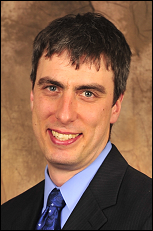Larsson Receives NSF CAREER Award
The National Science Foundation (NSF) awarded Mechanical Engineering Assistant Professor Johan Larsson a 2015 Faculty Early Career Development (CAREER) award for his project “Non-equilibrium wall-bounded turbulent flows at high Reynolds numbers.” While most people think of turbulence as what makes an airplane shake occasionally, in reality turbulence is a random or chaotic motion (think eddies in a river) that can occur in any fluid (liquid, gas or plasma). For example, even when an airplane is not shaking, it is experiencing turbulence in the thin layers of air over its wings and body—this type of turbulence is responsible for about half of the drag, fuel consumption and greenhouse gases emitted. Research and understanding of these turbulent flows is important for many scientific and engineering disciplines: power generation and propulsion; aerospace, naval and automotive applications; astrophysical and environmental flows; and many others. In most real world settings where turbulence occurs, it is out of equilibrium, i.e., it has not had sufficient time to reach an equilibrium state. However, the majority of current and past laboratory research and computer simulations investigating turbulence has involved looking at flows in equilibrium states—the classic scientific tradition of isolating individual physics and allowing for development of physical theories. In the real world however, turbulence experiences a changing environment—an accelerating or decelerating flow, a variable wall temperature, or similar—which current computer simulation models are not capable of predicting with great accuracy. "Right now for example, we are really good at modeling turbulence for airplanes at cruising conditions," says Larsson, "but we are not as good at modeling the turbulence that occurs during take-off and landing, where the air flow accelerates and decelerates much more strongly around the wing." Bridging this gap is precisely what Larsson aims to accomplish with his research, and he has set out to explore two areas of non-equilibrium turbulence: (1) situations where there are spatial variations in temperature of the surface beneath the fluid, and (2) the effect of strong acceleration and deceleration on turbulence. By better understanding how turbulence behaves in non-equilibrium conditions, Larsson can develop better computer modeling tools that could improve future aerospace and marine engineering design processes by reducing the time, and money, spent building scale models to account for factors previously unaccounted for in most computer simulations. Larsson’s research is enabled by the University of Maryland’s DeepThought2 supercomputer, which makes possible the computer simulations on thousands of processors required for this research. In addition, Larsson and his team will make use of the soon-to-be-operational Maryland Advanced Research Computing Center (MARCC). To learn more about Larsson and his research, visit his faculty webpage.
Related Articles: January 29, 2015 Prev Next |


